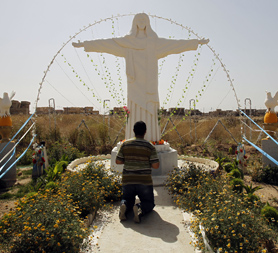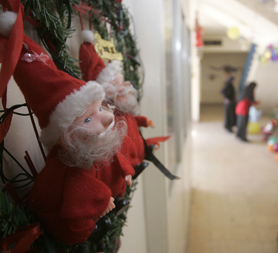Christmas in Iraq: living in fear
 Lindsey Hilsum
International Editor
Lindsey Hilsum
International Editor
Only one Baghdad church is celebrating Christmas fully this year, as Iraqi Christians face violence, prejudice and fear, writes Lindsey Hilsum for Channel 4 News and The Daily Telegraph.

Only one Baghdad church is celebrating Christmas fully this year, as Iraq‘s Christians fear a recurrence of the recent murders of their fellow parishioners and are forced to mark the occasion in the absence of over 1,000 families that have fled.
Five Islamist extremists burst into the church of Our Lady of Salvation in Baghdad in October, murdering two priests, holding the congregation hostage and eventually killing more than 50 people. Now, Amnesty International has warned of a spike in violence in the run-up to Christmas and has urged the Iraqi government to do more to protect Christians, who are now believed to number less than 500,000, about half the level of seven years ago.
Forlorn gathering of survivors
Only 40 people turned up for mass at Our Lady last Sunday. They sang and chanted, a forlorn gathering of survivors, the walls around them spattered with blood and cratered by bullet-holes. The bloodied hand prints of those who failed to escape marked the door in an ante-room.
In front of the altar stood photographs of the dead, including a light-haired smiling four year old boy, Adam Eashoue, and his 33-year old father, Uday. Adam’s grandparents, Zuhair and Amal, cannot bear to return to the church.
“I’ve lost my world,” said Amal at her home, who watched as her son and grandson were murdered.
I’ve lost my world. Baghdad Christian, Amal, who saw her son and grandson murdered.
“I don’t want to leave Baghdad – I was born and married here. But I have to think of my children.”
Her 16-year old daughter, Mirna, dressed in black, described how she played dead to avoid being killed. The house is full of painful reminders: Uday and his wife’s empty room, Adam’s toys, the baby cot for their 11-month-old granddaughter who is now in Italy with her mother and being treated for gunshot wounds.
“After the war, we thought we would stay here and have a future,” said Zuhair. “But after what happened at the church I don’t think so. It’s the government’s job to protect us, but they failed.”
Their cousins, Thaer and Nadia, and their two young sons, have already left Baghdad for the Kurdish area in northern Iraq.

“We love Christmas but this year it feels bitter,” said Thaer. “You sit somewhere and you’re afraid; you go shopping and you’re afraid; you go for a walk and you’re afraid. Iraq has become a hell.”
‘Infidels’
The Islamist extremists who attacked the church see Christians as infidels, although Christianity existed in the region several centuries before Islam. The Chaldeans and Syriac Christians of today speak Aramaic, the language Jesus would have spoken.
At St Catherine’s Monastery in Al Qosh in Kurdistan, monks are sheltering 21 families who fled Mosul in November after a spate of attacks.
We love Christmas, but this year it feels bitter. Thaer, Iraqi Christian.
“We were happy before the war,” said Hanna Khoder, who fled after her neighbour’s house was bombed and her sons threatened.
“But now the terrorists say, ‘the Americans are your people, they are Christians. You brought them here.’ And they kill us for it.”
Back in Baghdad, Canon Andrew White, an English vicar, is trying to stem the tide, attracting several hundred to his Christmas carol service last Sunday in St George’s, the Anglican church.
‘We Wish You a Merry Christmas’
The children of all shapes and sizes, a few wearing knitted hats in seasonal scarlet, stood in front of the altar singing “We Wish You a Merry Christmas” in English and Arabic with minimal attention to melody. The sound system screeched, and Father Christmas was trundled down the aisle in a box on wheels covered in red cloth and gold tinsel. A Sunni sheikh, who was there to show Muslim support of Christians, looked on. Outside, members of the Mothers’ Union Baghdad Branch (twinned with Portsmouth) sorted frozen chickens and other groceries to be given to each family.
The congregation frequently ask Canon White whether they should stay or leave.
“It’s very hard,” he said. “I can’t tell people what to do. But it’s important that we maintain a Christian presence here, because Christianity is the root of Iraq. If you cut the root, it’s finished.”
-
Latest news
-
Taylor Swift’s new break-up album breaks records3m

-
NHS trust fined £200K for failings that led to death of two mental health patients3m

-
Sunak vows to end UK ‘sick note culture’ with benefit reform3m

-
‘Loose talk about using nuclear weapons is irresponsible and unacceptable’, says head of UN’s nuclear watchdog3m

-
‘There wasn’t an Israeli attack on Iran,’ says former adviser to Iran’s nuclear negotiations team7m

-




